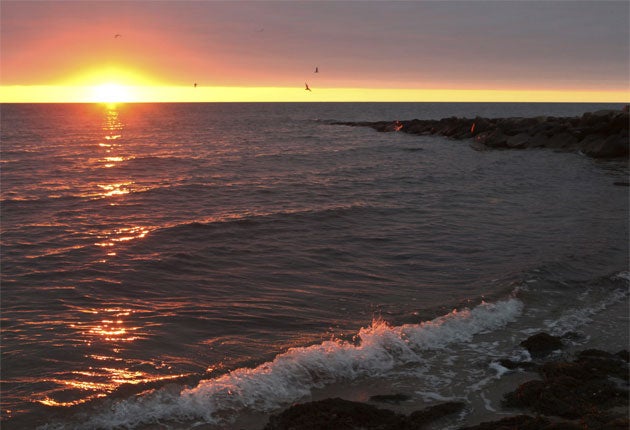Native tribes fight Cape Cod wind farm
Ten-year battle to build US's biggest wind turbines approaches endgame

Your support helps us to tell the story
From reproductive rights to climate change to Big Tech, The Independent is on the ground when the story is developing. Whether it's investigating the financials of Elon Musk's pro-Trump PAC or producing our latest documentary, 'The A Word', which shines a light on the American women fighting for reproductive rights, we know how important it is to parse out the facts from the messaging.
At such a critical moment in US history, we need reporters on the ground. Your donation allows us to keep sending journalists to speak to both sides of the story.
The Independent is trusted by Americans across the entire political spectrum. And unlike many other quality news outlets, we choose not to lock Americans out of our reporting and analysis with paywalls. We believe quality journalism should be available to everyone, paid for by those who can afford it.
Your support makes all the difference.The plan to build an enormous wind farm in Nantucket Sound, off the coast of Cape Cod in Massachusetts, has seen off a string of formidable enemies. They include the Kennedy clan, and others among the old money families of the coast, and Bill Koch, the billionaire oil and coal tycoon, the main financial force behind the opposition. The struggle to obtain the necessary permits has been under way for almost a decade.
The installation would, if constructed, be the biggest offshore wind farm in the US by far and would lend a much-needed shot of credibility to President Barack Obama's efforts to boost the renewable energy industry.
Last year, the battle appeared to have turned in the favour of the project, named Cape Wind, after a long-awaited environmental impact assessment concluded that the proposed wind turbines – 130 of them, each one 440ft high, spread over an area the size of Manhattan – would present negligible ecological problems.
But all bets were off again after complaints from two Indian tribes on Martha's Vineyard, the Mashpee Wampanoag and the Wampanoag Tribe of Gay Head. Wampanoag means "people of the first light", and the tribes maintain that Nantucket Sound is integral to their spiritual traditions of watching the sun rise in the east.
Their worship requires unrestricted views, they claim. And the project would also disturb their ancestral burial grounds. The National Park Service has heeded their plea, and the entire area of ocean has been listed for inclusion in the National Register of Historic Places.
It is not necessarily the death knell for Cape Wind. Supporters of the project say the Wampanoag's land is on the western side of Martha's Vineyard, which does not face Nantucket Sound. But it is certain to lend new hope to its opponents.
The Secretary of the Interior, Ken Salazar, has summoned all the parties involved in the debate to meet in Washington DC next week with a view to settling the issue by 1 March. "After several years of review, it is now time to move the Cape Wind proposal to a final decision point," Mr Salazar said in a statement.
The talks would, he added, "discuss how we might find a common-sense agreement on actions that could be taken to minimise and mitigate Cape Wind's potential impacts on historic and cultural resources."
That Washington is now expressing a fresh urgency about resolving the stand-off drew a tentative welcome from Cape Wind. "While we found the National Park Service decision disappointing, far more important is that Secretary Salazar has signalled the beginning of his personal involvement in bringing the Cape Wind permitting process to a speedy conclusion," a spokesman for the project, Mark Rodgers, commented.
The late Senator Kennedy was part of a coalition of Cape Cod residents and sailors who argue that the turbines, which would be clearly visible from shore on a clear day, would do grave damage to the area's tourism industry and spoil its natural beauty.
But they in turn were bitterly criticised by environmentalists who saw the coalition as having entered an unholy alliance with the coal industry, one of America's dirtiest industries, and of being guilty of stark hypocrisy over the affair.
The farm, first proposed in 2001, would cost at least $1bn to build. It would be visible from Nantucket itself and from Martha's Vineyard. Both islands are important magnets for prosperous summer visitors.
Mr Obama, who spent his summer holiday last year on the Cape Cod coast, has been careful not to take sides publicly on the controversy.
Join our commenting forum
Join thought-provoking conversations, follow other Independent readers and see their replies
Comments